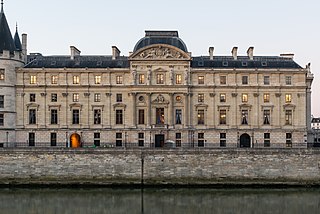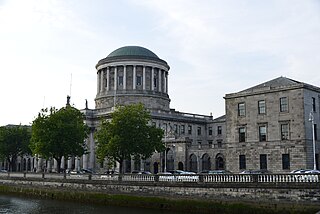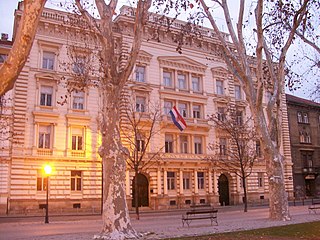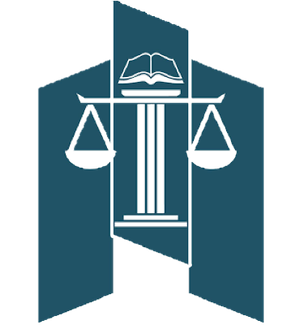Related Research Articles

The Czech Republic is a unitary parliamentary republic, in which the president is the head of state and the prime minister is the head of government. Executive power is exercised by the Government of the Czech Republic, which reports to the Chamber of Deputies. The legislature is exercised by the Parliament. The Czech Parliament is bicameral: the upper house of the Parliament is the Senate, and the lower house is the Chamber of Deputies. The Senate consists of 81 members who are elected for six years. The Chamber of Deputies consists of 200 members who are elected for four years. The judiciary system is topped by the trio of the Constitutional Court, Supreme Court and Supreme Administrative Court.

The Government of Italy is a democratic republic, and was established by the Italian constitution in 1948. It consists of legislative, executive, and judicial subdivisions, as well as of a head of state, also known as the president.

The Politics of Azerbaijan take place in an authoritarian system where elections are not free and fair, political opponents are repressed, civil rights are limited, human rights abuses are widespread, corruption is rampant, and power is concentrated in the hands of President Ilham Aliyev and his extended family.

The Dominican Republic is a representative democracy, where the President of the Dominican Republic functions as both the head of the government and head of the multi-party system. Executive power is exercised by the government. Legislative power is vested in the bicameral National Congress. The Judiciary is independent of the executive and the legislature.

The Court of Cassation is the supreme court for civil and criminal cases in France. It is one of the country's four apex courts, along with the Council of State, the Constitutional Council and the Jurisdictional Disputes Tribunal.

The Supreme Court of Ireland is the highest judicial authority in Ireland. It is a court of final appeal and exercises, in conjunction with the Court of Appeal and the High Court, judicial review over Acts of the Oireachtas. The Supreme Court also has appellate jurisdiction to ensure compliance with the Constitution of Ireland by governmental bodies and private citizens. It sits in the Four Courts in Dublin.

The judicial system of Turkey is defined by Articles 138 to 160 of the Constitution of Turkey.

In most legal jurisdictions, a supreme court, also known as a court of last resort, apex court, and highcourt of appeal, is the highest court within the hierarchy of courts. Broadly speaking, the decisions of a supreme court are binding on all other courts in a nation and are not subject to further review by any other court. Supreme courts typically function primarily as appellate courts, hearing appeals from decisions of lower trial courts, or from intermediate-level appellate courts. A Supreme Court can also, in certain circumstances, act as a court of original jurisdiction, however, this is typically limited to constitutional law.

The Supreme Court of Justice is the highest court of law in Portugal without prejudice to the jurisdiction of the Constitutional Court.

The Court of Cassation, officially called the Supreme Court of Appeals of the Republic of Turkey, is the last instance for reviewing verdicts given by courts of criminal and civil justice in Turkey.

The Supreme Court is the highest court in the Kingdom of Spain. Originally established pursuant to Title V of the Constitution of 1812 to replace —in all matters that affected justice— the System of Councils, and currently regulated by Title VI of the Constitution of 1978, it has original jurisdiction over cases against high-ranking officials of the Kingdom and over cases regarding illegalization of political parties. It also has ultimate appellate jurisdiction over all cases. The Court has the power of judicial review, except for the judicial revision on constitutional matters, reserved to the Constitutional Court.

The Constitutional Court was established by the Constitution of the Third Republic on 18 February 2006 as the highest constitutional authority in the Democratic Republic of the Congo. Its role is to ensure the constitutionality of laws and statues created by government officials and organizations.

The Constitutional Court of Slovenia is a special court established by the Slovenian Constitution. Since its inception, the Court has been located in the city of Ljubljana. It is the highest court in the country for reviewing the constitutionality and protection of human rights and fundamental freedoms, otherwise the highest court in the country is the Supreme Court of the Republic of Slovenia. The constitutional court is not part of any branch of government and is an independent state body.

The judicial system of Syria is a synthesis of Ottoman, French, and Islamic laws. The civil, commercial and criminal codes are primarily based on the French legal practices. Promulgated in 1949, those laws have special provisions sanctioned to limit application of customary law among beduin and religious minorities. The Islamic religious courts continue to function in some parts of the country, but their jurisdiction is limited to issues of personal status, such as marriage, divorce, paternity, custody of children, and inheritance. Nonetheless, in 1955 a personal code pertaining to many aspects of personal status was developed. This law modified and modernized sharia by improving the status of women and clarifying the laws of inheritance.

The Supreme Court of the Republic of Albania is the highest court of Albania and is the final court of appeals in the country's judicial system. It is composed of seventeen judges: the Chief Justice and sixteen Members.

The Sixth Amendment of the Constitution of South Africa made a number of changes, most importantly giving the title of "Chief Justice" to the head of the Constitutional Court instead of the head of the Supreme Court of Appeal. It was passed by the National Assembly with the requisite two-thirds majority on 1 November 2001, and signed by President Thabo Mbeki on 20 November; it was published and came into force on the following day.

The judiciary of Croatia is a branch of the Government of Croatia that interprets and applies the laws of Croatia, to ensure equal justice under law, and to provide a mechanism for dispute resolution. The legal system of Croatia is a civil law system, historically influenced by Austrian, Hungarian and Yugoslav law, but during the accession of Croatia to the European Union, the legal system was almost completely harmonised with European Union law. The Constitution of Croatia provides for an independent judiciary, led by a Supreme Court and a Constitutional Court. The Ministry of Justice handles the administration of courts and judiciary, including paying salaries and constructing new courthouses. It also administers the prison system.

The Constitutional Court of Guatemala is the highest court for constitutional law in the Republic of Guatemala. It is tasked with preserving the constitutional order by ruling on questions of the constitutionality of laws or state actions. The Court is normally composed of five titular or primary magistrates who serve five year terms. Each titular magistrate is appointed with a substitute. In special cases two substitutes are added to the bench for a total of seven to hear that case. Each titular member serves for one year as the president of the court.
The Judiciary of Azerbaijan exercises judicial power in Azerbaijan. Although the Azerbaijan constitution nominally guarantees judicial independence, the executive firmly controls prosecutors and judges. Judges and prosecutors collaborate in Azerbaijan to repress political opponents.

The Federal Supreme Court of Ethiopia is the highest court in Ethiopia. It was established by the Federal Democratic Republic of Ethiopia constitution in 1994 and is currently located in Addis Ababa. Article 78 of the Constitution establishes the judiciary and at the top is the FSC. By the Constitution, the Federal Supreme Court has "the power of cassation over any final court decision containing a basic error of law". In 2018, Prime Minister Abiy Ahmed appointed Meaza Ashenafi to be the first female president 0f the Federal Supreme Court. Solomon Areda Waktolla was appointed as Vice President of the Federal Supreme Court. Both were resigned by the Parliament on 17 January 2023, and replaced by Tewodros Mihret and Abeba Embiale as Chief Justice and Deputy Chief Justice of the Supreme Court respectively.